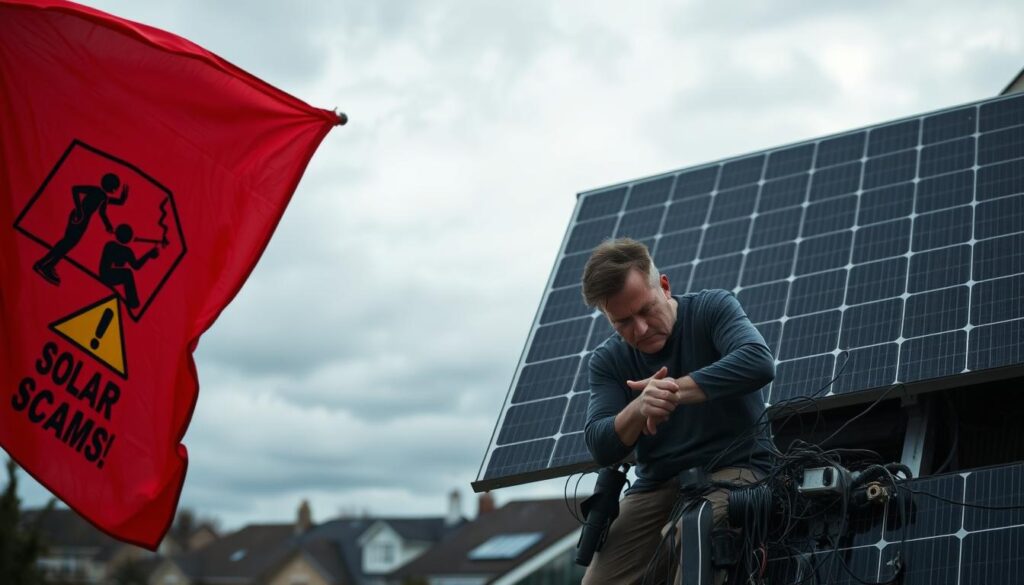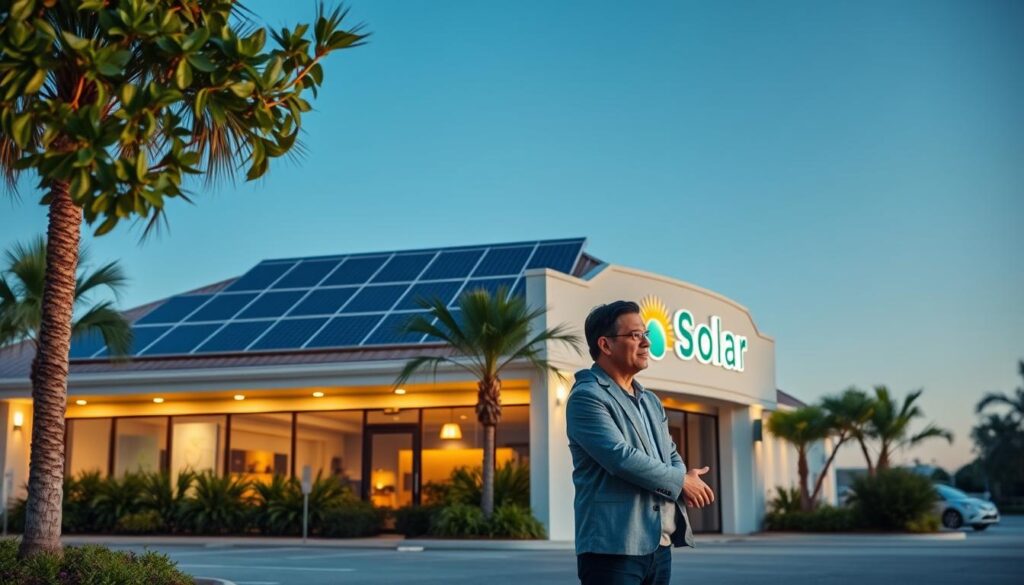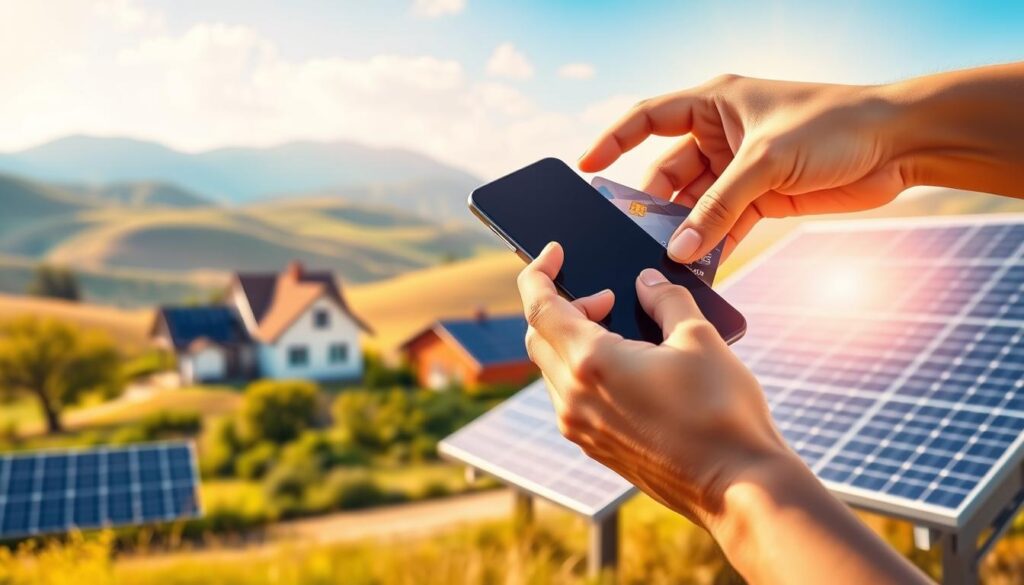Solar power scams florida are on the rise as more homeowners embrace clean energy. With over 5,000% growth in residential solar installations since 2008, Florida’s sunny climate has made it a prime target for both legitimate opportunities and fraudulent schemes. While just 1.5% of households report dissatisfaction with their solar systems, complaints have climbed sharply in the past decade. These issues often stem from hidden fees, misleading contracts, or high-pressure sales tactics. For instance, hidden fees on popular solar loans averaged 47% in late 2023, adding thousands to total costs. The federal solar tax credit, which offers 30% savings until 2033, can be misused by unscrupulous companies. This guide helps you navigate avoiding solar scams in Florida while maximizing the benefits of clean energy.
Key Takeaways
- 1.5% of households report solar installation issues, per Forbes 2023.
- Hidden fees on solar loans can add 47% to total costs, according to 2023 data.
- The 30% federal tax credit requires owed taxes to fully benefit.
- 85% of solar systems are financed, creating risks for uneducated buyers.
- Florida’s solar industry growth has outpaced scam detection efforts.
Understanding Solar Power Scams in Florida
Florida’s sunny climate makes it a prime target for solar power scams. Scammers exploit homeowners’ interest in renewable energy with deceptive tactics. Stay informed to avoid falling victim to solar power scams florida and safeguard your investment. Learn how to spot red flags and prioritize solar power consumer protection.
What Are Solar Power Scams?
These scams involve deceptive practices like false promises of “free” panels or exaggerated savings. Scammers often pressure homeowners into signing contracts without explaining terms clearly. For instance, solar energy fraud prevention starts with understanding that “free” solar offers may require long-term payments. Always verify claims through official channels like Florida licensing databases.
https://www.youtube.com/watch?v=nm2w-_9irhA
Common Types of Scams
- “Free” panel offers masking hidden fees
- High-pressure door-to door sales
- Fraudulent claims of government endorsements
Recent FTC data shows a 50% rise in complaints since 2022. Over 40% of Floridians admit confusion about florida solar fraud alerts, leading to costly mistakes. A 2023 study found 30% of scams involved companies falsely linked to utility providers like Florida Power & Light.
The Rise of Solar Scams in Florida
Florida’s booming solar market attracts legitimate businesses—and predators. Key factors driving this trend:
| Issue | Statistic |
|---|---|
| Homeowners approached by scammers | 30% |
| Complaint increase (2021–2023) | 50% |
| Consumers confused by “free” offers | 40% |
Five federal agencies now collaborate to combat these schemes. Always use solar power fraud tips like verifying licenses at CheckingMyFloridaLicense.com. Stay vigilant—real solar power consumer protection starts with knowledge.
Signs of a Potential Scam
Spotting solar power scam red flags starts with knowing what to watch for. Florida residents have lost thousands to schemes like those exposed in Attorney General Ashley Moody’s lawsuits against SetUp My Solar and MC Solar and Roofing. Here’s how to protect yourself with how to spot solar power scams and safeguard your investment:
High-Pressure Sales Tactics
- Watch for “act now” urgency like “this deal expires today” or “free systems” requiring upfront fees.
- Scammers often use tablets to rush through contracts, skipping details about warranties or permits.
- Legitimate companies like SunPower or Canadian Solar prioritize transparency, not time limits.
“High-pressure tactics are red flags. Take your time to review contracts.” – Florida Department of Agriculture

Unusual Payment Methods
Be cautious of requests for cash, wire transfers, or upfront payments over $200. how to spot solar power scams includes checking for hidden fees. For example, Setup My Solar reportedly collected payments without completing installations. Always:
- Require written quotes with all costs listed upfront.
- Avoid “free” offers that add hidden charges later.
- Confirm BBB accreditation (solar power consumer protection starts here).
Lack of Proper Licensing
Florida law requires solar installers to hold a Certified Solar Contractor License. Scammers like MC Solar often lack this. Verify licenses via FL’s Contractor Licensing Board. Reputable companies such as Weston Solar Solutions proudly display their credentials. Missing insurance or licenses mean:
- No warranty for faulty installations
- Increased risk of system failures
- No recourse for financial loss
Use solar power fraud tips to compare quotes from reliable solar panel companies in Florida. Prioritize firms with transparent contracts and BBB ratings.
Researching Solar Companies
Shopping for reliable solar panel companies in Florida requires careful research to ensure solar power consumer protection. Start by verifying a company’s track record to avoid falling prey to solar energy fraud prevention pitfalls.
Checking Customer Reviews
Look beyond a company’s website for honest feedback. Check:
- BBB profile for complaint history
- Google Reviews and Yelp
- Solar-specific platforms like EnergySage or SolarReviews
Be cautious of companies with fewer than 20 reviews or overly glowing ratings. Ask for references from past customers—legitimate solar power installation companies in Florida will gladly provide them.
Verifying Credentials
Confirm资质 through these critical steps:
| Certification | Issuing Body | What It Means |
|---|---|---|
| NABCEP Certification | NABCEP | Guarantees installer expertise |
| FL Solar Contractor License | Florida State | State-issued requirement for legal operations |
| BBB Accreditation | Better Business Bureau | Shows commitment to ethical practices |
Also check for roofing licenses—improper installations can cause leaks. Avoid companies without these credentials.
Comparing Quotes and Services
Never accept the first quote you receive. Follow these steps:
- Request at least three detailed quotes
- Ensure costs are itemized (panels, labor, permits)
- Compare warranties, payment schedules, and cancellation policies
Watch for solar power fraud tips like bundled fees or vague pricing. The average Florida system costs $2.75/watt, but prices vary. Companies offering deals far below this may cut corners.
Questions to Ask Solar Installers
Selecting the right solar partner requires clear answers. Legitimate solar power installation companies in Florida welcome these questions to build trust and ensure quality. Avoiding solar scams in Florida starts with transparency.

“Legitimate companies embrace accountability. Your questions help safeguard investments and ensure reliable service.”
Licensing and Insurance Information
Confirm credentials with these key questions:
- What is your Florida license number? (Verify via Florida’s official database)
- Do you carry general liability and workers’ compensation insurance? Provide certificates.
- Who assumes responsibility if damage occurs during installation?
Legitimate installers will share this info willingly. Avoid companies that hesitate—this could signal red flags.
Warranties and Guarantees
Ask for specifics on:
- Panel warranties (look for 25+ years for top brands like LG or SunPower)
- Workmanship guarantees (minimum 10 years)
- Performance guarantees ensuring promised output
Solar power consumer protection hinges on written warranty terms. Review details carefully—they’re your shield against future issues. Ask what triggers voiding warranties, like improper maintenance.
Experience in the Local Market
Ensure expertise in Florida’s unique conditions:
- How many installations have you completed here?
- Do you have a local office and certified technicians?
- How do you handle Florida’s climate, like hurricanes?
Reputable companies will highlight local experience. Reliable solar panel companies in Florida know state codes, permitting, and weather-resistant designs. Avoid those with no local references.
These questions help you separate legitimate providers from scams. Take time to compare answers and choose a partner committed to solar power consumer protection.
Understanding Solar Contracts
Protecting your rights starts with every line of your solar contract. Solar power consumer protection relies on clear terms and transparency. Reviewing agreements carefully shields you from costly surprises down the line.
Key Terms to Look For
Legitimate contracts outline specifics like system costs, equipment brands, and warranties. Look for details on:
- Total system cost, including installation and fees
- Equipment specs (panels, inverters, and warranties)
- Timeline for installation and inspections
- Ownership of Renewable Energy Credits (RECs)
Recognizing Red Flags
Solar power scam red flags often hide in vague language. Watch for:
- Missing payment schedules or hidden fees
- Automatic renewal clauses for leases
- Penalties for early termination
- Terms allowing liens on your property
Legitimate companies like FLSEIA-certified installers avoid such traps. Always ask for written clarification on unclear terms.
Importance of Reading the Fine Print
Fine print holds secrets. High-pressure salespeople might rush you, but solar energy fraud prevention demands patience. Check for:
- Arbitration clauses limiting legal rights
- Conditions voiding warranties
- Requirements to pay for system removal at contract end
Never sign without verifying all details. Florida residents report frequent scams using long-term leases with inflated buyout prices. Consult a lawyer if clauses feel unfair.
Reporting Solar Scams
Protect yourself and others by reporting solar scams promptly. Florida’s consumer protection laws empower you to act against fraud. Your report helps authorities stop deceptive practices and safeguard communities.
How to Report a Scam in Florida
- Call the Florida Attorney General’s 1-866-9-NO-SCAM (1-866-966-7226) or file an online complaint at MyFloridaLegal.com.
- Submit details to the Better Business Bureau to alert others about questionable companies.
- Contact local county consumer protection offices for guidance on solar power consumer protection measures.
Importance of Consumer Reviews
Sharing experiences helps others avoid scams. Post honest reviews on platforms like Google, Yelp, or the BBB. Highlight specifics like contract terms, installation quality, and customer service. This promotes solar energy fraud prevention by exposing unethical practices.
“FPL never demands payment via gift cards or cryptocurrency. Always verify requests through official channels,” warns FPL’s consumer guide.
Working with Local Agencies
Local agencies like county consumer affairs offices can mediate disputes. Provide documentation like contracts, emails, and payment records when contacting them. Reports help track fraud trends and protect reliable solar panel companies in Florida by exposing impostors.
Collaborate with law enforcement if scams involve identity theft or large financial losses. Stay proactive to support solar power consumer protection efforts across the state.
Protecting Your Personal Information

When working with solar companies, prioritize solar power consumer protection by knowing what information to share and when. Legitimate installers need basic details like your address and roof measurements to provide accurate quotes. Avoid sharing sensitive data like Social Security numbers or bank account information early in the process.
“Your account will be disconnected unless you pay now!”
Scammers often use urgency to trick victims. Look for suspicious emails demanding immediate payment via gift cards or cryptocurrencies. Check for misspelled domains, generic greetings, or links to unfamiliar sites. Always contact companies through official numbers listed on bills, not links provided in emails. In 2023, over 20,000 Americans fell for utility scams—many due to phishing tactics.
Ask companies about their solar energy fraud prevention measures. Legitimate firms should explain how they store data and comply with Florida privacy laws. Review privacy policies to ensure they outline data use, sharing practices, and security safeguards. Avoid vendors that retain financial info long-term or lack clear data protection plans.
Florida law requires businesses to safeguard personal information. If a company refuses to clarify their policies, consider it a solar power scam red flag. Always opt-out of marketing lists unless needed, and confirm how solar monitoring systems protect your network security.
Benefits of Legitimate Solar Power
Choosing reliable solar panel companies in Florida ensures you unlock real benefits without falling prey to avoiding solar scams in Florida. Legitimate solar power installation companies in Florida provide systems that deliver measurable savings and environmental impact.
Long-Term Savings on Energy Bills
Florida Power & Light’s SolarTogether program shows how solar can reduce costs. Participants may see savings after 7 years, though non-participants might wait up to 26 years. Reliable companies use data like your utility bills to design systems matching your home’s needs. A 7.15 kW system, average for Florida homes, can cut monthly electric bills by hundreds over decades. Avoid companies promising unrealistic “zero bills”—real savings depend on system size and energy use.
Environmental Benefits
Solar reduces reliance on fossil fuels. A typical residential system offsets 3-5 tons of CO2 yearly. Florida’s sunny climate makes solar panels effective, but check if companies use panels meeting U.S. EPA safety standards for materials like cadmium. The International Energy Agency confirms solar energy cuts smog-causing pollutants, improving local air quality. Ask installers how their systems align with state renewable goals.
Available Tax Credits and Incentives
Legitimate solar power installation companies in Florida will explain the federal Solar Investment Tax Credit (30% until 2032). 22% in 2024). The Florida property tax exemption for solar equipment lowers long-term costs. Use tools like the PV Value® calculator to estimate how solar boosts home resale value. Check with the Clean Energy States Alliance for financing guides to avoid scams promising “free” panels—solar power consumer protection starts with informed choices.
Resources for Florida Solar Users
Protecting your investment starts with knowing where to find trusted guidance. Florida residents exploring solar energy can turn to these verified resources for solar power consumer protection and avoiding solar scams in Florida.
Government Websites and Agencies
- Florida Office of Energy provides state-specific guidelines and incentives, including details on the 30% federal tax credit for solar installations.
- The Florida Public Service Commission offers tools to verify contractor licenses and review utility-related regulations.
- DSIRE (Database of State Incentives for Renewables & Efficiency) lists current rebates and programs, helping families access solar energy fraud prevention tools.
Consumer Protection Organizations
Stay informed through groups dedicated to solar power consumer protection:
- Better Business Bureau (BBB) tracks florida solar fraud alerts and offers complaint databases for reliable solar panel companies in Florida.
- Florida Consumer Action Network provides free guides on contract reviews and warranty comparisons.
- Solar Energy Industries Association (SEIA) offers a certified installer directory and complaint resolution services.
Local Solar Advocacy Groups
Join community-driven initiatives for real-world insights:
- Solar United Neighbors organizes group purchasing programs to reduce costs and vet installers collectively.
- Rethink Energy Florida hosts free workshops explaining how to spot solar fraud alerts and leverage tax incentives.
- Local Sierra Club chapters offer peer networks where homeowners share experiences with reliable solar panel companies in Florida.
Combining these resources ensures you make informed decisions and safeguard your investment against fraud. Always verify credentials through official channels before finalizing any agreement.
Conclusion: Empowering Yourself Against Scams
Florida’s solar energy boom offers clean power but demands vigilance. Solar power fraud tips and solar power consumer protection strategies are key to navigating this growing market. By prioritizing research and choosing reliable solar panel companies in Florida, you can enjoy long-term savings without falling prey to scams.
Staying Informed
Stay ahead of solar power scams in Florida by tracking FTC updates and local news. Scammers often use fake reviews or pressure tactics, so verify licenses via the state database. Follow agencies like the FTC to recognize red flags like demands for crypto payments or delayed warranty support.
Building Trust with Reputable Companies
Choose companies with physical offices and certifications. Legitimate solar power installation companies in Florida, such as Aspire Solar, provide clear contracts and upfront pricing. Avoid firms using high-pressure sales or refusing to discuss payment methods like bank transfers instead of crypto.
Making Informed Choices for Solar Energy
Always compare quotes and read contracts thoroughly. Avoiding solar scams in Florida means never accepting rushed decisions or fake IRS threats. Legitimate installers like Aspire Solar ensure systems match your energy use, avoiding overpromises. A well-researched choice protects your investment and environment.
